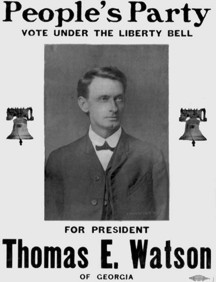You know this is a Protestant country, and the Catholics and Jews are here under sufferance."
Introduction: Over the past months I have described the development of anti-Judaism in Christian theology and its transformation into secular antisemitism with the 18th century Enlightenment. In the 19th century secular antisemitism quickly evolved into a political movement with an agenda aimed at excluding Jews from civil society and antisemitic parties appeared throughout the West. In Germany-Austria the political agenda changed from social exclusion to physical extermination with the goal of achieving a final solution to the West’s Jewish Problem. This week we turn to the evolution of political antisemitism in the country with the largest surviving post-Holocaust Jewish Diaspora population, the United States
As in Europe, organized political antisemitism also appeared in the United States Europe , a movement to deny Jews legal and social rights did not just appear: it emerged from an already present antisemitic culture.
The first Jews to set foot in the New World arrived with Christopher Columbus in 1492. In 1584 Joachim Gaunse, a Jewish metallurgist who accompanied Sir Walter Raleigh to the Virginia territory, was threatened with blasphemy and forced to return to England Brazil and sent him back to Portugal New York New World and persecuted and executed their “suspect” Conversos, Catholics of Jewish descent.
While the 1789 US Constitution, following Enlightenment principles, protected citizen rights regardless of religion, the first acts of “political” antisemitism came in the form of “states rights,” which allowed states to make local laws, including a state’s relations with Jews. Anti-Jewish legislation would only be rescinded in North Carolina in 1869, while New Hampshire
As for “popular antisemitism,” attitudes held by individuals: “when a Jew rose to national prominence, he would always be open to attacks based upon his Judaism.” Mordecai Noah, a diplomat to Tunis
Political antisemitism: Social stress is generally associated with a rise in antisemitism. This was also true during the Long Depression of 1873 to 1896. The period gave rise to the emergence of populist political parties, most of which were short-lived. With the appearance of the Populist, or Peoples Party, things changed and antisemitism entered American party politics.
During the presidential election of 1896 no “political party was above using anti-Semitism, especially to appeal to Christian constituents, but it was the Populist Party who used anti-Semitism most distinctively.”
Watson on a 1904 People's Party campaign poster. (Wikipedia)
Tom Watson, who will reappear when we discuss the lynching of Leo Frank, was named vice presidential choice on the 1896 Populist Party presidential ticket and, in 1904, the party’s choice for president. The "Populists strengthened their cause by using religious metaphors to link money with a Jewish conspiracy [giving license to mainline parties to do the same]. Thus in 1896 Democratic presidential candidate William Jennings Bryan, speaking in an idiom Protestant Fundamentalists were fully conversant with, could easily intersperse biblical imagery with economic necessity when he thundered, `You shall not press down upon the brow of labor this crown of thorns, you shall not crucify mankind upon a cross of gold.' The antisemitism evoked by the metaphor of the crucifixion was powerful and appealed to rural Protestants who possessed a similar religious and cultural heritage with other Americans in the South and the West," (Leonard Dinnerstein, Antisemitism in America, p.49-50). But when standing before a Jewish audience Bryan temporized, "We are not attacking a race, we are attacking greed and avarice, which know neither race nor religion. I do not know of any class of our people who, by reason of their history, can better sympathize with the struggling masses in this campaign than can the Hebrew race," from The First Battle, (p.581).
By the twentieth century racist antisemitism was even more open and popular, appearing in vaudeville, on the stage and even in the movies. In 1913, amidst a heated antisemitic atmosphere, an innocent Leo Frank was convicted of murder and, when the governor commuted his sentence, was dragged from his cell and lynched. One result of the lynching was the decision by B’nai Brith, of which Frank was regional director, to form the Anti-defamation League. Another was the re-emergence of the Ku Klux Klan. By the 1920’s Henry Ford was distributing his Dearborn Independent by mail and in Ford Motor dealerships across the country. Its main contribution to the spread of antisemitism was publication, under the banner of the International Jew, the Protocols of the Elders of Zion. American antisemitism was equal to that taking hold in Europe , with Jews discriminated against in housing, employment and recreation.
A 1934 edition by the Patriotic Publishing Company of Chicago (Wikipedia)
Parties specifically targeting Jews proliferated in the years leading up to the Second World War. “The era gave rise to domestic anti-Jewish bigots, such as Father Charles Coughlin, Gerald L. K. Smith and William Dudley Pelley, the leader of the Silver Shirts. It also witnessed the rise of the German-American Bund, led by Fritz Kuhn, and the notorious anti-Jewish speech by the aviator and US
Other writings in this Series:





